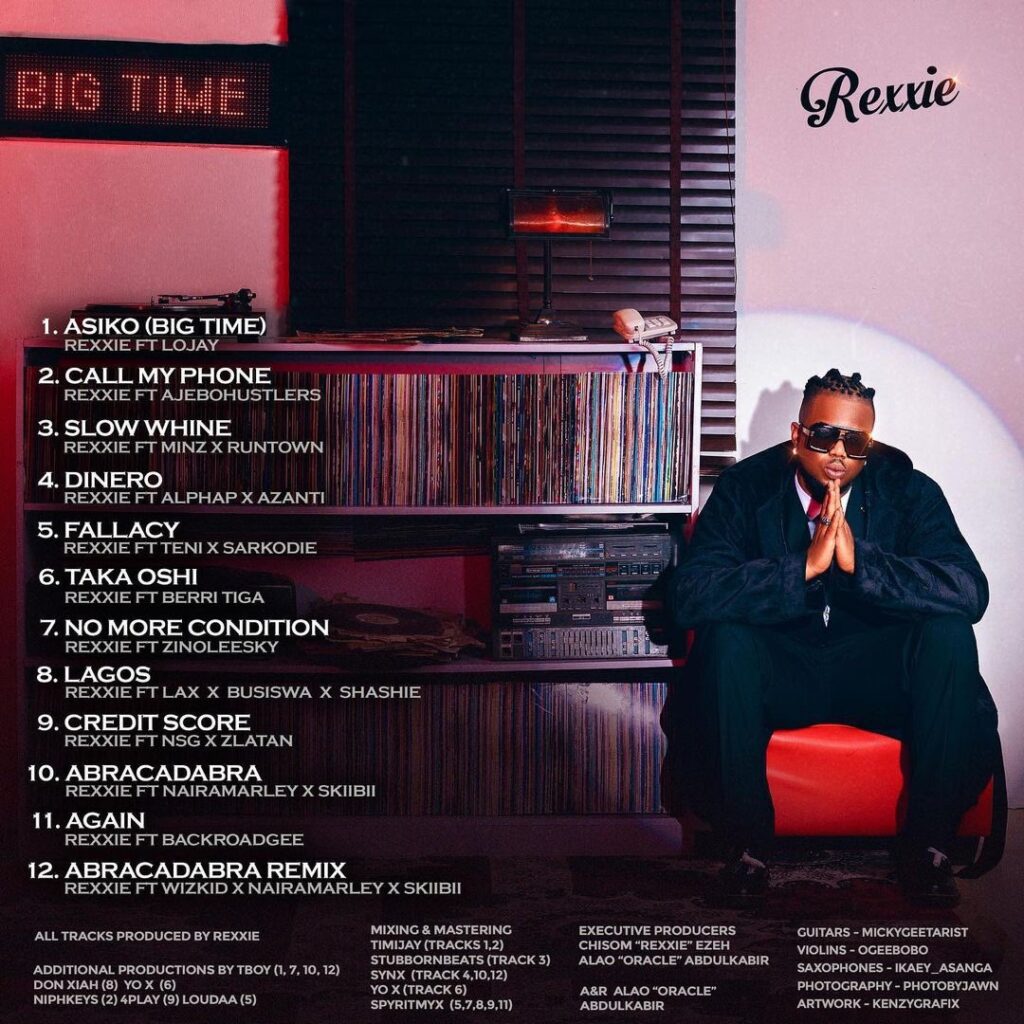Every aspect of Big Time combines to create a project that is greater than the sum of its parts…
By Yinoluwa Olowofoyeku
The “producer takeover” continues with Rexxie releasing his sophomore LP, Big Time, barely two weeks after Kel-P graced us with his own effort. However, unlike Kel-P and many of the others, Ezeh “Rexxie” Chisom Faith seems content to remain outside the booth and shine where he shines best; in the production chair. As such, Big Time is a classic producer project, wherein Rexxie provides all of the instrumental thrust for the album and then calls on a diverse cohort of artistes to provide the vocals. The feature list is long and rich, playing host to numerous contemporaries, superstars, frequent collaborators, and rising acts.
The first artist at bat is Lojay on “Asiko (Big Time),” and he knocks it well out of the park. “Asiko” is an amazing opener. Lojay flexes his melodic and lyrical muscles all over a gentle Amapiano-adjacent instrumental. Additional production by Tboy, and violins by Ogeebobo complete the emotive sonic atmosphere over which Lojay boldly struts his stuff. The log drums get a bit overenthusiastic in places, and I believe they take away from the sugary nature of the song just a bit. I understand that Amapiano is the leading sound at the moment, but not everything needs driving log drums, I found myself thinking multiple times on other Amapiano-esque moments across the project.
(Read also: Enkay Ogboruche’s Declaration Album Wields the Scepter of Praise)
On the topic of Amapiano adjacency, Rexxie seems to have found a pocket there that works really well for him. This is a burgeoning compromise with the Afrobeats space that I will start calling Afropiano, and Rexxie does it beautifully. Beyond the aforementioned “Asiko,” we also get “Dinero,” featuring Alpha P and Azanti. Both acts maximise their light vocal timbres to weave ear-catching melodies over a smooth energetic violin laden instrumental. Here, the log drums are used sparingly at clever moments to enhance the bassline and emphasise the rhythmic pockets embedded in the beat.
There’s also the stellar “Taka Oshi,” featuring rising talent, Berri-Tiga. He spins contagious positive vibes atop a cheerful instrumental bolstered by a lively bassline and tropical strummed guitars. Ajebo Hustlers-assisted “Call My Phone” is another such song, but this one falls a bit short of its Afropiano peers. Ajebo Hustlers deliver perfectly serviceable vocals without doing much that seems exceptional or particularly inspired. We get even more violins and nice synth runs, but they don’t pick the song up by much.
In sharp contrast, “Credit Score” exemplifies the possibilities of these Amapiano fusions with the unlikely pairing of NSG and Zlatan riddling this beautiful energetic beat with a delightful array of varied, unique, and engaging deliveries.

(Read also: Lojay’s Gangster Romantic EP Is 2023 Project of the Year Material)
On occasion, Rexxie ventures further beyond the safety of Afropiano into the full depths of Amapiano, but to mixed effect. “No More Condition” is the best of the bunch. It features Zinoleeksy doing his Zinoleesky thing as expected, gliding seamlessly with laid back melodies and simple storytelling lyrics over a very cheerful Amapiano beat with robust bass synth passages and simple lightweight percussions.
“Lagos” is a more concerted effort from Rexxie and Don Xiah, embracing the deeper instrumental elements of Amapiano: the dark rumbling synth bass, the whistles and syncopated percussions, and understated log drums. In keeping with the focus, famed South African singer, Busiswa, was enlisted alongside Shashie and L.A.X to deliver soft-spoken and fitting vocals. The song is very well put together and decently energetic, but it would struggle to stand out amongst other high-calibre Amapiano songs.
Then we get to the matter of the trending smash hit, “Abracadabra,” that served as one of the lead singles preceding Big Time’s release. The instrumentals are steeped in contagious Amapiano energy, with the perfect bounce and vibes to carry the song regardless of whatever vocals topped it. And while Skiibii did not leave much impact on the song, Naira Marley’s catchy hook is the lynchpin and highlight of the song. The project also has the remix of the song which tasks Wizkid with bolstering the runaway success of the song with his undeniable star power. The end result? Inconsequential. The remix lands with a dull thud and doesn’t seem to add any significant extra to the base song.
Skipping on from those, the tracklist is completed by three songs totally devoid of Amapiano influences, as a small display of versatility. “Fallacy” is my favourite of the bunch. The sweet buttery smooth instrumentals are co-produced by Loudaa and comprise a simple two-chord progression propped up by sparse Afroswing drums and flittering background synths. Layered over these emotive instruments are the delightful vocals of the outstanding Teni Makanaki. Her pure timbre dances around the beat with heart-warming melodies and lyrics to match. The Ghanaian phenom, Sarkodie, provides a sonic counterpoint on his verse, delivering anecdotal lines in his signature cadence, albeit slowed down a beat to match the mood of his co-star.
The second is Minz and Runtown’s “Slow Whine.” The track is built on a bouncy bassline, simple keys, and sprinkled with saxophone runs courtesy of Ikaey Asanga. The drums are an effective Afroswing pattern. Minz and Runtown also complement the simplicity of the beats with their laid-back unflustered verses, leaning on their melodic agility and rich voices to create a relaxed soundscape perfect for the titular slow whines.

The weakest of the three songs, and perhaps the weakest song on the album is the BackRoad Gee-assisted “Again.” The 808s land with very little impact, the drums rattle away without palpable energy, and BackRoad Gee drops the ball with the deliveries. There is a degree of bravado energy in the actual vocals, but it doesn’t translate to the song as a whole, with a forgettable chorus and rapped verses that don’t capture the listener’s attention.
(Read also: DJ Tunez The Amexin EP Is a Promising and Sleek Introduction to Amexin)
Big Time is a testament to the diversity of talent in the industry and what can be achieved by strong collaboration. Every aspect of Big Time combines to create a project that is greater than the sum of its parts. Each beat (except one) is well-crafted, interesting, and enjoyable in its own rights. The production (both primary and additional) as well as the supporting instrumentalists join forces to craft beats that many artistes would clamour to grace. Then comes the exceptional A&R efforts by Alao “Oracle” Abdulkabir, envisioning the right artistes for each song.

Selecting the appropriate feature is never easy, especially when multiple features are being put on tracks with styles that may vary from their bread and butter. Every artist sounds like the right fit for the song they are on. Finally, kudos to the artists themselves for delivering as intended on each song, complementing the beats they were given with captivating melodies and meaningful lyricism where required. While Big Time doesn’t rise to the heights of the most exemplary producer projects (as it lacks a certain level of cohesiveness and thematic intentionality), it is a banging collection of songs that provides an entertaining listening experience, and will furnish many Afro-playlists with jams.
Lyricism – 1.1
Tracklisting – 1.5
Sound Engineering – 1.5
Vocalisation – 1.4
Listening Experience – 1.5
Rating – 7/10
Yinoluwa “Yinoluu” Olowofoyeku is a multi-disciplinary artist and creative who finds expression in various media.




